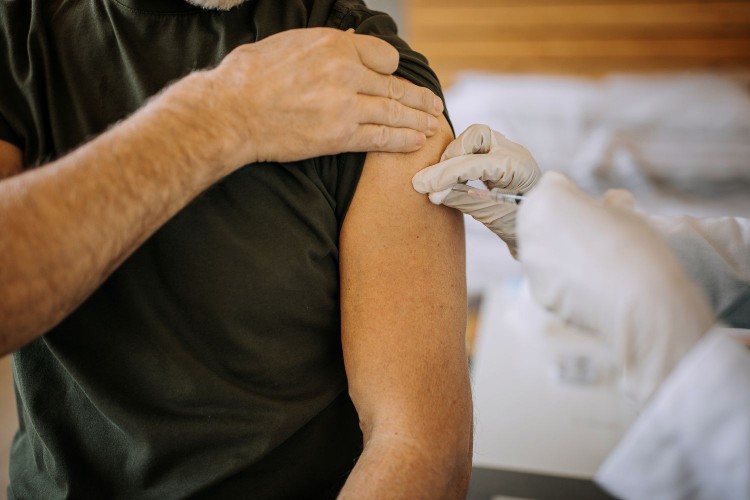Two new vaccines for respiratory syncytial virus (RSV) are available this year for people aged 60 and older, as well as for those between 32 and 36 weeks pregnant.
These vaccines-Arexvy by GSK and Abrysvo by Pfizer—are the first for RSV.
The new vaccines come with common vaccine side effects including swelling or pain at the injection site, fever, and headache, among others.

With RSV (respiratory syncytial virus) season almost in full swing, medical professionals are urging people to speak to their healthcare providers about getting vaccinated.
Two vaccines, Arexvy (GSK) and Abrysvo (Pfizer), have already rolled out; both are single dose and approved for people aged 60 and older, and Abrysvo has also been approved for those between 32 and 36 weeks pregnant to help protect newborns. These are the first RSV vaccines ever available.
These are “great [tools] to protect some of our most vulnerable patients,” Nora Colburn, MD, an infectious diseases specialist and clinical assistant professor at The Ohio State University Wexner Medical Center, told Health.
If you are eligible for these vaccines, you might be wondering if it makes sense to get a shot—and, more specifically, if it will come with side effects. Here’s what you need to know.
FDA Approves First-Ever RSV Vaccine for Adults 60 and Older RSV is a fairly common virus that most children contract at least once before they reach age two.
While most people who get RSV experience mild cold-like symptoms, the infection can turn serious for some people, particularly infants and older adults with chronic diseases. People may develop potentially fatal infections such as pneumonia or bronchiolitis, which is inflammation in the lungs’ airways.
According to the Centers for Disease Control and Prevention (CDC), up to 80,000 children younger than five are hospitalized yearly for RSV, and as many as 300 die. Between 60,000 and 160,000 people aged 65 or older go to the hospital each year for RSV, with 6,000 to 10,000 fatalities.
In most states in the U.S., RSV season typically runs from mid-September to mid-November and generally peaks for a few weeks starting in late December.
Vaccines expose a person’s cells to specific germs or parts of a germ, such as its protein, to initiate an immune response to a virus.
While all vaccines have the same end goal, manufacturers design them in different ways, Brian Labus, PhD, MPH, REHS, an expert in infectious diseases and an assistant professor in the department of epidemiology and biostatistics at the UNLV School of Public Health, told Health.
For example, “mRNA vaccines use a small piece of viral genetic material to stimulate our body to produce proteins,” Labus said. “Inactivated vaccines use all the proteins found in killed viruses. And, subunit vaccines, like the RSV vaccines, consist of specific viral proteins grown in a lab.”
Because subunit vaccines use only certain proteins from the germ, they give a “very strong” immune response that’s targeted to key parts of the virus, according to the Department of Health and Human Services. Other subunit vaccines include those protecting against HPV, hepatitis B, and shingles.
“Both vaccines were 80% to 90% effective in reducing RSV illness during the first season after vaccination,” Labus said.
However, he noted that “the clinical trials were not large enough to determine the efficacy in reducing hospitalization or death.”
As for which vaccine was more effective, William Schaffner, MD, a spokesperson for the National Foundation for Infectious Diseases (NFID), told Health that there is no substantial difference between Arexvy and Abrysvo. He recommended getting the one your medical provider has stocked.
What Is a 'Tripledemic'? Experts Warn COVID, Flu, and RSV May Converge This Winter According to the CDC, common vaccine side effects reported by clinical trial participants were swelling or pain at the injection site, fever, headache, nausea, diarrhea, and muscle or joint pain. These symptoms tended to be mild.
Some clinical trial participants reported developing inflammatory conditions, including Guillain-Barré syndrome (GBS), a rare neurological disorder in which the body’s immune system attacks part of the peripheral nervous system. But the CDC said it’s unclear whether the vaccines caused these conditions or if they would have developed anyway.
“There was a notion that the use of the vaccine might [also] initiate atrial fibrillation, but the Advisory Committee on Immunization Practices and the Food and Drug Administration think these are likely to be statistical flukes,” said Dr. Schaffner.
Out of the roughly 34,000 people who either received the vaccine or a placebo during the clinical trial, roughly 0.5% experienced a life-threatening reaction. Adverse events up to one month after the injection were reported 9% of the time with the vaccine—with about 1% of those injection-related.
“The Vaccine Adverse Event Reporting System (VAERS), a national early warning system to detect possible safety problems in vaccines in the U.S., will monitor their ongoing safety as we use these vaccines,” said Dr. Schaffner.
In light of the possibility that the vaccines may cause “inflammatory neurologic events,” the CDC recommends that only people “at the highest risk for severe RSV” be vaccinated.
According to Labus, adults over age 60 may have an elevated risk of RSV complication if they live in a long-term care facility or have chronic conditions that make it harder for them to fight off an infection, such as heart, lung, liver, or kidney disease.
“Unlike other vaccines, there isn’t a blanket recommendation that everyone eligible receive the vaccine,” he said. “The CDC has emphasized the importance of shared clinical decision-making in using the RSV vaccine, where patients and their healthcare providers determine if the person will benefit from the vaccine.”
Dr. Colburn said it’s possible to get the RSV vaccine at the same time as the COVID and flu vaccines, but it’s best to discuss whether to do so with a healthcare provider. “We just don’t have much data on how the three interact in terms of efficacy or side effects,” Labus said.
